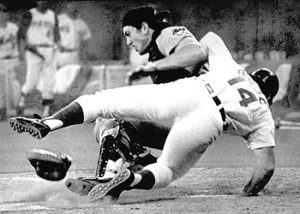I detest major sports leagues’ all-star games.
National Hockey League all-star matches produce 14-10 results, with players refusing to check each other hard to prevent goals.
National Basketball Association all-star games routinely end in scores such as 160-152, which are the product of dunk fests and zero defense being applied.
The National Football League might produce a 42-35 result at its Pro Bowl all-star game as the players refuse to hit each other with the same ferocity they do during the regular season or postseason.
Now we have the baseball all-star game, which until this week actually meant something. The winning league gets home field advantage during the World Series. That’s a big deal, man!
Now, though, Major League Baseball has just agreed to a new collective bargaining agreement with the players union. For the next five years — the length of the new agreement — the MLB all-star game will not determine which league gets home field advantage in the World Series.
That means base runners won’t necessarily try to stretch doubles into triples, or try to score from first base on a single, or try to take out the shortstop with a hard slide into second base.
Sure, occasionally big-leaguers play some serious hardball during these all-star games. Cincinnati Reds infielder Pete Rose in the 1970 all-star game? He barreled into Cleveland Indians catcher Ray Fosse at the plate, bowling Fosse over, injuring him so severely that he never recovered fully. Must’ve been an Ohio rivalry thing.
Oh well. These big-leaguers don’t want to provide further risk to injury by playing an all-star game to a result that actually means something of value to the eventual winners of the American and National League playoffs.
It was nice while it lasted.
